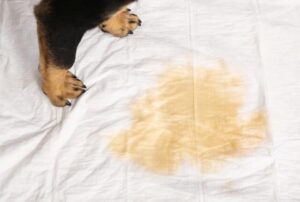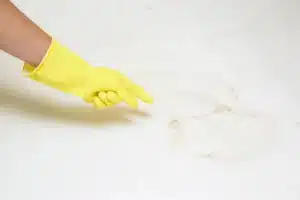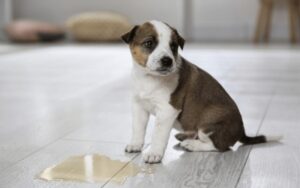Have you ever walked into your kitchen only to find your dog has flipped their food bowl, scattering kibble all over the floor? While this can be a frustrating mess to clean up, it’s a surprisingly common behavior in dogs. But why do they do it? Let’s dive into the possible reasons behind this curious habit and explore ways to address it if it becomes a problem.
Reasons Why Dogs Flip Their Food Bowls

1. Instinctual Behavior
Dogs are descendants of wolves, and some of their behaviors are rooted in instincts. In the wild, wolves often move their food to a safer or more private location before eating. By flipping the food bowl, your dog might be mimicking this instinct to “secure” their meal.
2. Seeking Attention
Dogs are incredibly social creatures and often seek interaction with their owners. If your dog notices that flipping their food bowl gets your attention—even if it’s just to scold them—they might repeat the behavior to engage with you.
3. Boredom or Playfulness
Sometimes, dogs flip their food bowls simply because they’re bored or find it entertaining. They might enjoy the sound the bowl makes or the way the kibble scatters, turning mealtime into a fun game.
4. Dislike of the Food
Your dog might flip their bowl if they’re unhappy with the food. This could be due to the taste, texture, or even temperature. Dogs can be surprisingly picky eaters!
5. Comfort Issues with the Bowl
The type of bowl you’re using might be uncomfortable for your dog. For example, bowls that are too deep, too shallow, or made of a material they don’t like (such as metal, which can be noisy or reflect light) might lead to flipping.
6. Marking Territory
Flipping the food bowl could be your dog’s way of marking their territory. By scattering food, they might be trying to spread their scent or assert dominance over the space.
7. Overfeeding or Stress
If your dog is overfed or feeling stressed, they might flip their bowl as a way to communicate discomfort. Stress can stem from various factors, like changes in their environment, loud noises, or the presence of other pets.
How to Prevent Bowl Flipping
If your dog’s bowl-flipping habit is becoming troublesome, here are some strategies to help:
1. Choose the Right Bowl
Invest in a weighted or non-slip bowl that’s harder for your dog to tip over. You can also try puzzle feeders or slow-feed bowls, which engage your dog’s mind while they eat.
2. Address Their Diet
If your dog dislikes their food, consider switching to a different brand or flavor. Consult your veterinarian for recommendations on high-quality, nutritious options.
3. Establish a Routine
Dogs thrive on routine. Feed them at the same times each day and in a quiet, consistent location to create a calming environment during meals.
4. Offer More Stimulation
Provide your dog with toys, regular walks, and interactive play to prevent boredom. If their energy is channeled elsewhere, they’ll be less likely to turn mealtime into a game.
5. Avoid Reinforcing the Behavior
If your dog flips their bowl for attention, avoid reacting. Instead, calmly clean up the mess without making a fuss, and praise them only when they eat properly.
6. Monitor Stress Levels
Pay attention to your dog’s emotional state. If stress or anxiety seems to be the cause, try to identify and eliminate the source. You can also speak with your vet about anxiety-relief solutions.
Frequently Asked Questions
1. Is it normal for dogs to flip their food bowls?
Yes, it’s relatively common. While the reasons vary, most dogs do this out of instinct, playfulness, or as a way to communicate.
2. Should I be worried if my dog flips their food bowl?
In most cases, it’s harmless. However, if the behavior is sudden or paired with signs of stress, illness, or loss of appetite, consult your veterinarian.
3. How can I stop my dog from flipping their food bowl?
Try using a non-slip or weighted bowl, adjusting their diet, and providing more mental and physical stimulation. Avoid reinforcing the behavior by reacting to it.
4. Could my dog’s food bowl be the issue?
Yes, the material, size, or shape of the bowl could make your dog uncomfortable. Experiment with different types to find what works best for them.
5. Can training help prevent this behavior?
Absolutely. Use positive reinforcement to teach your dog to eat calmly from their bowl. Reward them when they eat without flipping it.
Final Thoughts
While flipping their food bowl might seem like a puzzling or mischievous act, it’s often your dog’s way of communicating or satisfying a natural instinct. By understanding the reasons behind this behavior and addressing any underlying issues, you can help make mealtime a more enjoyable experience for both you and your furry friend.














